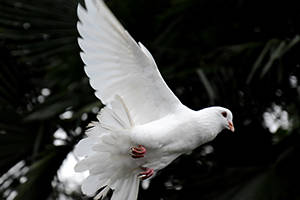To Sen. Bernie Sanders, I-VT, David Koch’s wealth and influence were emblematic of everything wrong with America. But when his supporters cheered the mention of Koch’s death during a campaign rally last week, Sanders rightfully tried to steer them toward the higher road.
“I don’t applaud, you know, the death of somebody,” Sanders calmly told the crowd. “We needn’t do that.”
The moment was similar to one that occurred during a campaign rally for Sen. John McCain in 2008. When a woman from the audience said she couldn’t trust Barack Obama to be president because “he’s an Arab,” McCain calmly defended him as “a decent family man” who he happened “to have disagreements with on fundamental issues.”
“I want everyone to be respectful” McCain told his supporters that day. “Because that’s the way politics should be conducted in America.”
Cheering Koch’s death was anything but respectful. It reminded me of Sebastian Junger’s reaction to U.S. marines celebrating the death an enemy after a firefight that occurred while he was an embedded journalist with a platoon in Afghanistan.
The “cheer deflated me” he wrote several years later. “I liked these guys tremendously, but that celebration was just so ugly. I didn’t want them to be like that.”
That wasn’t his final judgment though. After asking one of the soldiers why they cheered, he understood it was because that “particular fighter would never again be able to kill an American soldier.”
That’s war.
Junger’s telling of that story was part of a larger search to understand why, in a well-publicized incident he did not witness, some soldiers urinated on the dead bodies of several Taliban fighters. “But of course they have dehumanized the enemy” he wrote, “otherwise they would have to face the enormous guilt and anguish of killing other human beings.”
That’s also war, he explained, without justifying the act. More notably, he also placed responsibility on the moral contradictions between the soldiers’ transgression and the multiple ways in which Americans dehumanize our foreign enemies.
Junger expanded that indictment four years later in his book Tribe. “In combat” he wrote, “soldiers all but ignore differences of race, religion and politics within their platoon.” But at home they hear Americans “speak with level of contempt that is usually reserved for enemies in wartime, except now it’s applied to our fellow citizens” and “often directed at people who have been excluded from a group or declared unworthy of its benefits.”
And now segments of our society are cheering the death of their political adversaries like many cheered the killing of Osama bin Laden.
This week, former Alaska political journalist Rebecca Braun warned that such “demonization poses a clear and present danger” all across America. “Unchecked vitriol begets violence. History has proven that the unthinkable happens over and over, and it begins when we dehumanize each other.”
Braun’s remedy parallels Junger’s effort to understand behavior of America’s soldiers that appalled him. Despite our “valid differences in policy and priorities” she wrote, “most of us are not as far apart as we think.” To rediscover our shared values, we need step away from the talking heads and social media networks that tend to validate “our worst beliefs about those we mistrust or fear” and respectfully talk through our disagreements.
Cheering Koch’s death wasn’t an invitation to such conversations. It only served as temporary reinforcement to the false sense of unity and righteousness of the echo chamber.
I have strong disagreements with almost all the political agenda that animated David Koch. But his wealth didn’t buy him freedom from the moral contradictions every human being faces. Trying to understand him as a more complex person isn’t an act of political correctness. It’s recognition that no bridge to the other side can be built with hatred.
And it’s as an opportunity to reflect on our own role in healing America and the world.
Because it’s fine to resent the wealth Koch amassed and the laws that allowed him greater influence than the rest of us. But clearly, he was committed to principles he cherished. He wasn’t afraid of the notoriety that came with taking a public stand. Those aren’t just character traits political activists hope people bring to their cause. They challenge everyone to take their efforts to a higher level.
• Rich Moniak is a Juneau resident and retired civil engineer with more than 25 years of experience working in the public sector. He contributes a weekly “My Turn” to the Juneau Empire. My Turns and Letters to the Editor represent the view of the author, not the view of the Juneau Empire.

